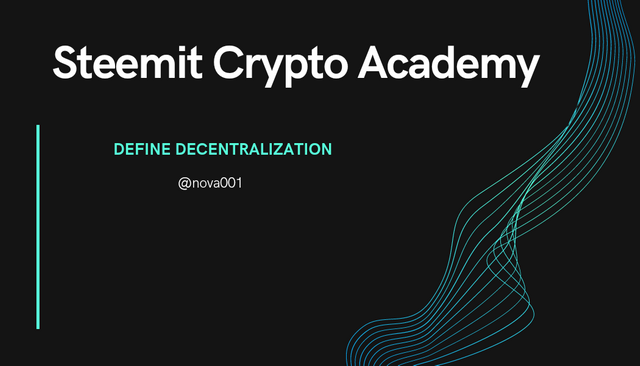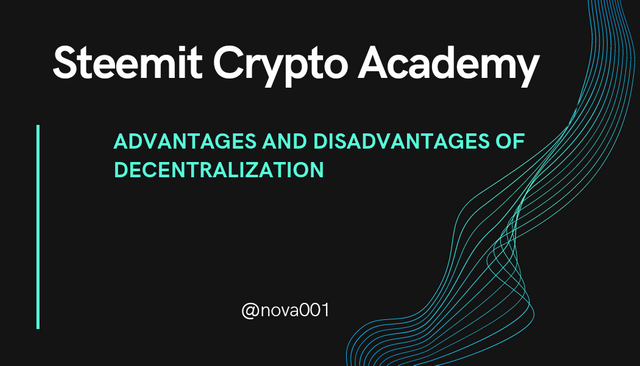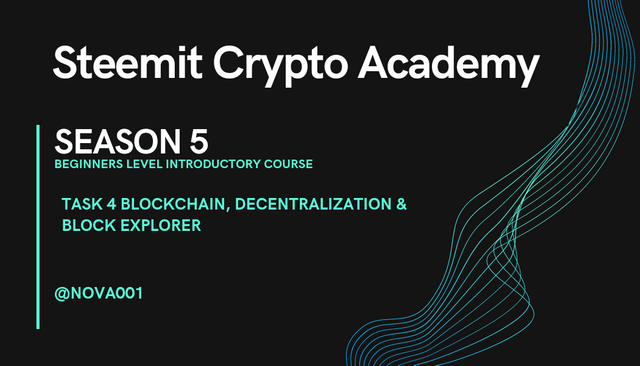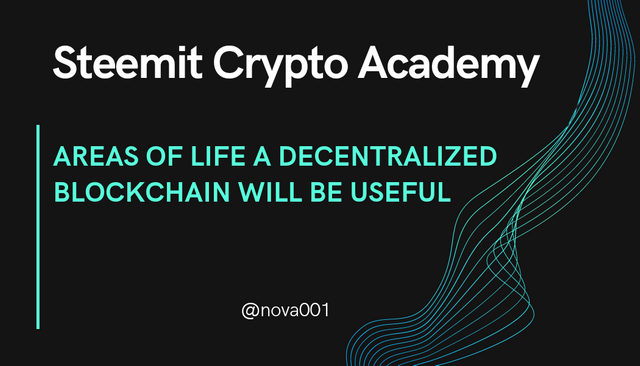Crypto Academy Season 5 Beginner Course - Task 4: Blockchain, decentralization & blockexplorer @nova001
Image created and edited with [canva] (https://www.canva.com/)
Define decentralization. Describe the advantages and disadvantages of a decentralized system. In what areas of life can a decentralized blockchain be useful? (write in your own words)
Let's get started ...

Image created and edited with [canva] (https://www.canva.com/)

Image created and edited with [canva] (https://www.canva.com/)
Let's see what benefits decentralized systems can provide.
Advantages.
Let's look at an example: suppose you want to sell your house. You do not use a real estate agency because you are PRO of decentralization (not because you are pichirre hehe). In this way, the transaction for the sale of your house is carried out directly between you and the buyer. There are no intermediaries (decentralization), therefore, there are a lot of savings in terms of commissions, resulting in a better sale price for you (who sells) and a better purchase price for the person who acquires the house.
Operability:
Privacy and transparency at the same time:
This is privacy, but on the other hand, any user of the system could, if necessary, see all the information of that transfer that was made, this is transparency. All transactions are transparent and are there for everyone to see, but no one can move a single piece of that information.
To clarify the information that is available and that we can review, it has to do with the transaction itself, that is: date and time of the transaction, public keys, balances of public keys before and after the transaction, etc., there will never be information or personal data.
In one example, banks control all of our personal information. From where we live, where we work, how much we earn, how much and when we are paid, our name and surname, identity card and a long etc. This happens because banks are centralized systems and they have all the power, control and information.

Disadvantages.
irreversible Operations:
This is undoubtedly one of the biggest problems of the decentralized system. There is no room for error and that can often result in lost capital. Once an operation has been done, there is no way to delete, return or cancel it. This is why in decentralized systems much care is taken, that all parties are familiar with all processes and thus avoid errors.
lack of training:
As we have explained, in a decentralized system all parties have the authority and power to decide and act. Remember that nobody supervises or controls. This in many occasions can end in "malpractice" on the part of some members of the system. Many times we will find ourselves, within these systems, unprepared people.
Anonymity:
The anonymity provided by a decentralized system is a double-edged sword. The privacy and anonymity that is beneficial in many cases, becomes a problem, since it can be used for illegal acts such as money laundering and various types of fraud.
In particular, I think there are many areas where a decentralized system would be useful. I will try to explain this with 2 problematic situations, where I think that a decentralized system would be the solution.
Voting and Elections.
Currently in my country Nigeria, there is total distrust towards the entire system that is in charge of elections and voting for public office
A decentralized blockchain that was in charge of running the entire election and voting process would be excellent and would end all the current mistrust towards the election results.
As we already know, a decentralized blockchain does not need personal data. This would give total security and peace of mind to the people who vote, since there would be no possibility of pressure towards them, as they do not have to expose personal information.
You could also eliminate the fear that many people may feel, thinking that it is possible that someone knows who their vote was for.
Finally, the transparency and veracity of the results would be irrefutable, since in a decentralized blockchain for voting, there would be no way to edit or alter the votes that are generated, resulting in total credibility and acceptance of the results.
Basic services.
Another area in which a decentralized blockchain would be very interesting is that of basic services. In my country there is a big problem and it is that all basic services (water, electricity, telephone, gasoline, among others) are a source of corruption. The intermediary entities or persons obtain juicy benefits at the expense of the common citizen, who ends up paying high prices to obtain some of these services that are fully controlled and controlled by the intermediaries.
It would be beautiful to eliminate all that corruption with a decentralized system where each person could obtain (paying just enough) any basic service, without having to go through the hands of companies and intermediaries.
Conclusion
To conclude this article I can say that without question, decentralization offers many advantages that we do not have with centralization. It is true that progress is made every day and attempts are made to apply decentralization more and more, in various areas of daily life, but it is also true that the great leaders, companies and businesses that control everything in our lives through centralization, they are not willing to let all that power and all the information they handle lose. Decentralization can solve many problems in various areas of life, but applying it means that large centralized systems lose money and influence.
hi professor @shemul21 my task 3 has nit yet been upvoted hear is the link
Cc:
professor @shemul21
Professor @dilchamo
@steemcurator01
@steemcurator02


%20(2).jpeg)
%20(3).jpeg)
%20(4).jpeg)
%20(5).jpeg)
%20(6).jpeg)

%20(7).jpeg)
%20(8).jpeg)